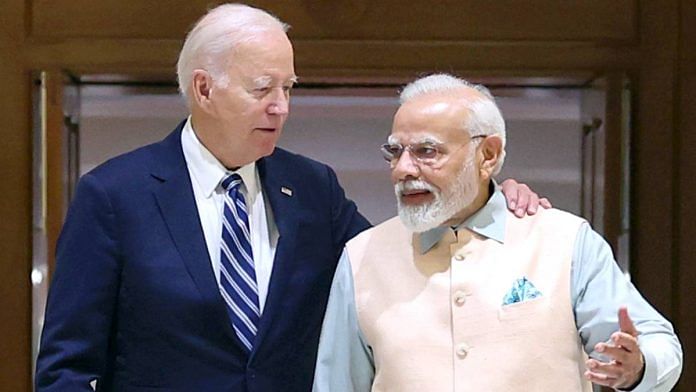New Delhi: Reiterating the importance of decarbonising the transport sector, a joint statement issued by India and US shortly after bilateral talks between Prime Minister Narendra Modi and US President Joe Biden Friday, took note of the PM-eBus Sewa scheme, the details of which were cleared by the Union cabinet on 16 August.
Biden arrived in India Friday to take part in the G20 Summit taking place under India’s presidency this weekend in New Delhi.
The India-US statement mentions the progress made in expanding electric mobility in India, “including joint support for a payment security mechanism financed through both public and private funds”.
“This will accelerate the procurement of 10,000 made-in India electric buses including those for the Indian PM e-Bus Sewa program that will include the associated charging infrastructure. The two countries are committed to working together to help diversify the global supply chain for e-mobility,” the joint statement added.
The statement has again brought into focus the public transport scheme which was first announced in the Union budget in 2021.
The PM-eBus Sewa scheme envisages to provide electric public bus transport in cities that have poor or no bus transport facility. The Rs 57,613 crore scheme will be implemented on a public-private partnership (PPP) basis.
The PM had said last month that the scheme will “redefine urban mobility” as 10,000 electric buses along with supporting charging infrastructure will be developed in cities with a population between three and 40 lakh.
Of the Rs 57,613 crore announced for the scheme, Rs 20,000 crore will be paid by the Centre, of which around Rs 15,000 crore will be allocated for bus operations and the balance will be spent on creation of supporting infrastructure for electric buses.
The scheme has two components — augmentation of city bus infrastructure and green urban mobility initiatives (GUMI). Last month, the ministry of housing and urban affairs (MoHUA), which is piloting the scheme, issued the guidelines for the implementation of the first component of the scheme, which is augmenting the bus infrastructure.
The ministry has identified 169 cities that are eligible to apply for the scheme. The cities will be selected through a grand challenge method, and will be ranked on five parameters, such as deficit of buses, availability of bus depots, availability of power supply, earnings per km, and scrapping of internal combustion engine (ICE) buses.
Cities which face a massive shortage of buses but have abundant land to set up bus depots, or already have fully developed bus depots, or have an agreement with discoms to set up power infrastructure for e-buses, will get a high score.
Transport experts have called the scheme a game changer as it will not only provide cost-effective public transport facilities in cities, especially tier 2 and 3, but also decarbonise the transport sector by providing 10,000 electric buses.
Amit Bhatt, managing director-India, International Council for Clean Transportation, told ThePrint last month, “The PM e-bus initiative has the potential to be a transformative game-changer, as it aims to bolster public transport capacity by 25 per cent. Moreover, the pronounced focus on electric buses within this initiative offers substantial advantages from a public health standpoint.”
Also read: Trans-nation train & port link to counter China, to 6G: What tops US agenda with India at G20
Central tender for buses
The procurement of 10,000 buses will be done via a common tender which will be floated by the Convergence Energy Services Limited (CESL) in lots and be based on the demand raised by cities for the number of types of buses (standard size, midi or mini), a ministry official had told ThePrint.
Of the 169 cities, there are 10 — three in Uttar Pradesh, one each in Bihar, Rajasthan, Maharashtra, Madhya Pradesh and Tamil Nadu, and two in Kerala — with a population between 20-40 lakh that are eligible to apply for the scheme. The rest have a population of 3-20 lakh.
The guidelines state that cities with a population of 3-40 lakh will get 60 percent of the total project cost as central assistance, while hill cities and Northeast capital cities will get 90 per cent, and other capital cities of Union territories with no legislature will get 100 per cent central funding.
In several cities, there are private operators who are running bus services. The guidelines say, “The city shall sign an MoU with the regional transport office for regulating existing private operators along the city bus routes.”
The cities will also have to sign MoU with concerned departments to ensure maintenance of road infrastructure.
To ensure better participation from private players in the scheme, the Centre has made a provision in the guidelines wherein state governments will guarantee timely payment to bus operators.
(Edited by Poulomi Banerjee)
Also read: New Delhi ‘turned down’ White House requests for more press access to Biden-Modi bilateral meet



